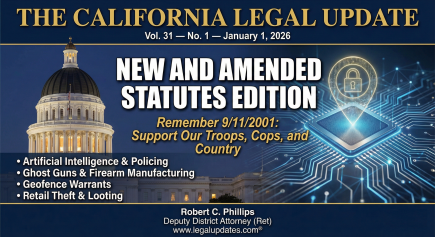

- Ref # CAB00116
- February 15, 2022
A Search Warrant is Required for Seizure of a Vehicle Parked on a Third Party's Private Property (Peo. v. Rorabaugh (January 2022) 3DCA, #C090482, 2022 Cal. App. Lexis 60).
CASE LAW ALERT by Ray Hill, Professor Emeritus, Santa Rosa Junior College
Ray Hill is a retired Police Lieutenant and Professor Emeritus at Santa Rosa Junior College. He has taught in the POST Basic Academy and Advanced Officer Training for 45 years.
A SEARCH WARRANT IS REQUIRED FOR SEIZURE OF A VEHICLE PARKED ON A THIRD PARTY’S PRIVATE PROPERTY (Peo. v. Rorabaugh (January 2022) 3DCA, #C090482, 2022 Cal. App. Lexis 60).
The victim’s beaten and strangled body was found floating in an irrigation canal in San Joaquin County. A co-defendant told officers he saw the defendant (6’2” – 280 pounds) on the top of the victim repeatedly punching him in the face. They both loaded the victim into the trunk of the defendant’s 1966 Oldsmobile Cutlass and dumped the incapacitated victim, moaning and bloody, into the canal.
Officers obtained search warrants for the defendant’s residence and vehicle. When serving the warrant at the defendant’s residence, his father told officers that the defendant’s Cutlass was parked on an adjacent ranch owned by third party. Officers went to the ranch which was accessed by a ¾ mile, private driveway. Officers entered through the open gate and observed the vehicle 200 yards from the main ....








